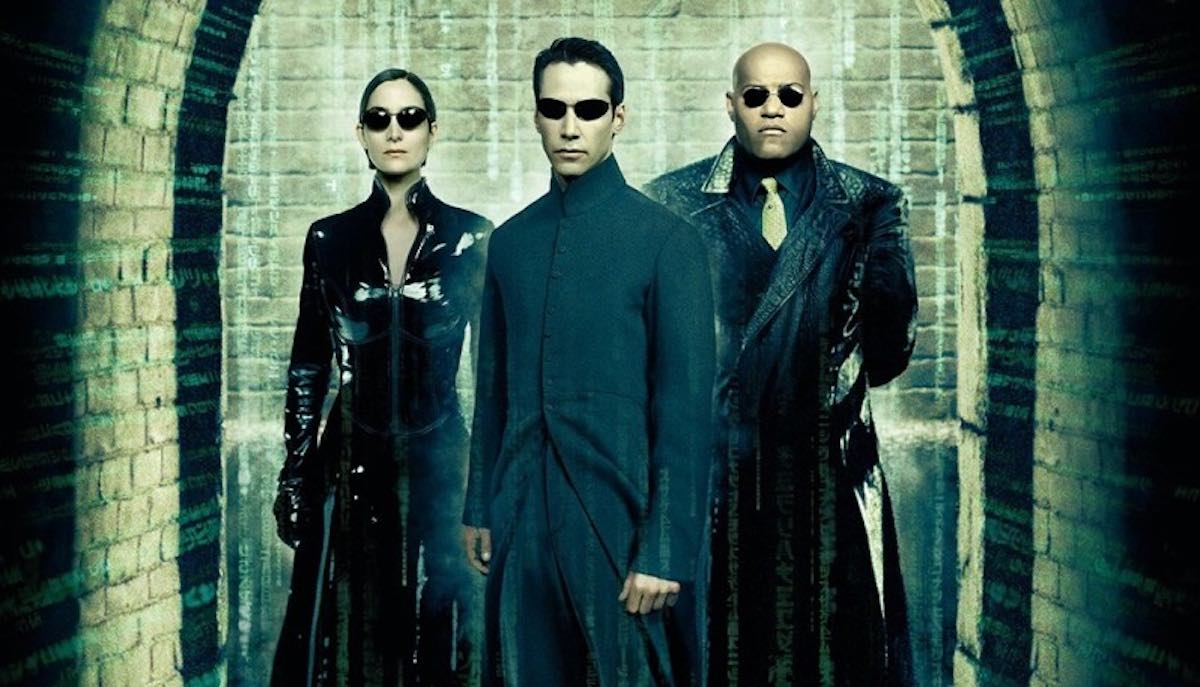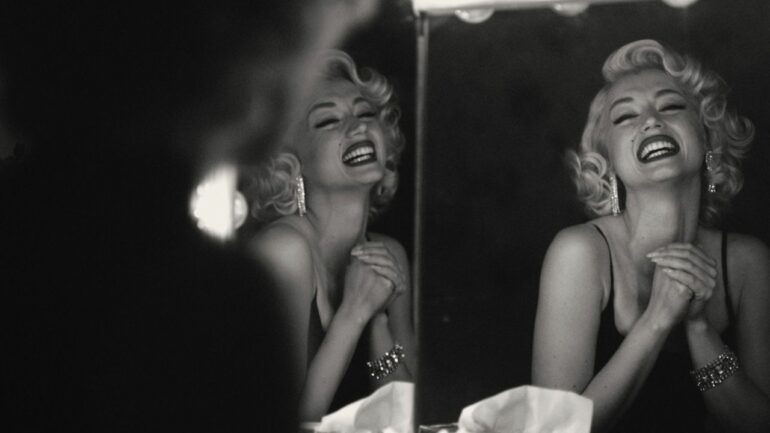chevron_left
-
play_arrow
NGradio So good... like you
The Matrix: 37 Things You Probably Didn’t Know About The Sci-Fi Masterpiece

The Matrix is one of the most iconic and best sci-fi movies ever made
Few movies have had as significant an effect on pop culture as The Matrix. Everything about it, from the revolutionary “bullet time” action scenes to the leather-clad style, became instantaneously iconic. And on top of those inimitable stylistic choices, the movie was smart, with something to say that has kept viewers thinking about it and re-watching it over and over again ever since.
But just because you’ve watched The Matrix dozens of times doesn’t mean you know everything there is to know about it. Sure, you’ve probably noticed the obvious Easter eggs, like the very specific books in Thomas Anderson’s apartment, or the way Neo’s duel with Agent Smith mimics classic Westerns. But there are certain things you can only find out by digging into the ancillary materials created around a movie–in other words, by watching the special features and listening to the audio commentaries on the “Ultimate Matrix Collection” Blu-ray set.
With The Matrix 4 on the horizon (for better or worse), we did just that. These facts, quotes, and anecdotes were all pulled from either the audio commentary or the many making-of featurettes included with the series’ definitive collected release. Read on to find out what we learned. And don’t worry–this list only covers the original. We revisited the sequels already once, and that was plenty.
1. Nobody besides the Wachowskis understood the script
The Wachowskis had never directed a film before, but they wound up directing this one because nobody else, including production designer Owen Paterson, director of photography Bill Pope, star Carrie-Anne Moss, and everybody at Warner Bros., understood what the hell the movie was. The one exception? Lawrence Fishburne, who claims he understood it perfectly the very first time he read it.

2. The opening scene was deliberately ambiguous
In the movie’s opening scene, viewers are meant to be confused about who to root for. “We liked the idea of not necessarily recognizing anybody in the first few scenes of the movie. When you see Trinity sitting there in the dark hotel room, again, you don’t know who the good guy is and who the bad guy is,” says Lilly Wachowski.

3. This move has a name
It’s called “The Eagle,” according to Carrie-Anne Moss.

4. The opening originally featured a train

5. This weird twirl required some clever digital effects
When they shot this stunt, Carrie-Anne Moss’s feet and hands were tied together and she was hung vertically so she could spin, visual effects supervisor John Gaeta reveals. However, that left her limbs looking stiff, so, at the Wachowskis’ behest, Gaeta digitally altered Moss’s legs to make them look like they were moving.

6. Moss didn’t think she’d get the part
She assumed the part of Trinity would go to “a name” in Hollywood. “It was just another audition that I was going on in between my life,” she says. After reading her scenes, however, the filmmakers asked her to punch and kick a punching bag, and after she left, she heard them cheering in the other room.

7. The Wachowskis assigned Keanu Reeves homework
The Wachowskis gave star Keanu Reeves three books to read before he even opened up the script. “I had to read [French philosopher Jean] Baudrillard, I had to read Out of Control [by Kevin Kelly], which was about systems, evolution, and robots, and then there was another book which was Evolutionary Psychology, which is basically emotions and psychology from a Darwinistic point of view,” Reeves says.

8. The club scene was shot at a real S&M club in Sydney, Australia
“All the extras in the scene, there was a casting call that went out to patrons of the club, and they all came self-costumed,” says editor Zach Staenberg. “It was pretty wild at lunch, seeing everyone walking around on leashes.”

9. Carrie-Anne Moss auditioned with this scene
“It’s looking for you,” she mimics along in the audio commentary.

10. Agent Smith has some surprising influences
Hugo Weaving deliberately gave Agent Smith a non-specific accent. His wardrobe was designed to evoke a secret agent, while his exact manner of speaking recalled an authoritative but neutral voice, such as a newscaster. Laurence Fishburne, who plays Morpheus, compares Smith to Walter Cronkite. In addition, Weaving began to incorporate elements of the Wachowskis themselves in the character, which the directors joke about in the special features.

11. Keanu’s mouth was covered for five hours to shoot this
He had to communicate via pen and paper for the duration of shooting this scene. In the commentary, Reeves calls this “a fun day.”

12. This scene was done using a fake torso
The torso was based on a cast of Keanu’s body, and it includes a surprising amount of detail.

13. The bug extractor took 12 weeks to build
Editor Zach Staenberg says it’s a fully functional, practical device that took a model maker 12 weeks to build. “It’s an incredible, working device,” he says. Good to know in case we ever get infected with a shrimp-like robotic tracking bug.

14. The movie inverts a typical cyberpunk trope
“We like cyberpunk fiction,” says Lilly Wachowski. “The problem with it is that nobody basically knows what cyberspace looks like, or in the end, it’s not a very interesting idea…all the metaphors that sort of happen when you start talking about simulation or falseness of the cyber world disappear when that has no context for the viewer. So we thought if we make this world the fake world, then all of those metaphors and all of those metaphors that work in cyberpunk fiction continue to work.”

15. Keanu’s weight fluctuated crazily throughout filming
Throughout filming, Keanu constantly worked to lose or gain muscle mass and weight depending on whether they were shooting scenes featuring Neo or Thomas Anderson. For the scene where he’s woken up and ejected from the goopy pod, he lost 15 pounds to look more emaciated.

16. This goo was initially freezing cold
The goo pod scene was shot practically, and required endless testing–from the consistency of the goo and the “skin” on top that breaks as Neo emerges, to the prosthetics that pop out of the sockets on his body. According to Reeves, by the time he had to get inside the pod to film the scene, the filmmakers had figured out that the goo would need to be heated first, because the people testing it out had gotten hypothermia just from being in it for as little as eight minutes at a time.

17. Keanu was recovering from spine surgery when they started training
“I’d had a two level fusion in my cervical spine,” Reeves says. “My legs were getting–I was getting paralyzed. So I’d had the surgery done and then it was just a waiting game just to see if it was fused. But it really hindered me a lot in training because I couldn’t kick–I couldn’t train to kick for two of the four months.”

18. Some of these acupuncture needles are genuine
Many of the needles you see in this scene were inserted into an elaborate prosthetic, but the ones in Keanu’s head are real, according to editor Zach Staenberg.

19. The Nebuchadnezzar’s chairs were based on 1920s dentist chairs
It makes sense when you think about it.

20. The Wachowskis insisted the actors do the fight scenes
“[The Wachowskis] kept saying to me, ‘We want the actors to actually be able to do the kung fu,'” says producer Joel Silver. “I would say to them, ‘What’s the big deal? Let’s get the people who can do the kung fu.’ But [they] were convinced that they wanted to see these actors doing those things themselves.” The Wachowskis got legendary Hong Kong action guru Yuen Woo-ping onboard to that end.

21. This triple kick alone took 21 takes
And they had no time to rehearse it before shooting began.

22. Switch was supposed to be trans
“The Switch character was meant to be feminine in The Matrix but she was a guy in the real world,” Fishburne says. “They decided to take that out because they felt it might confuse the audience some more.” For Morpheus, Fishburne acted more “feminine” and “nurturing” while in the real world, and more masculine inside the Matrix.

23. This scene features several sets of identical twins and triplets
“I had an idea when the sequence with the cat, where you see the cat twice and you talk about deja vu, we decided to include that in the scene near the fountain, to continue that idea of the Matrix was glitching. So we cast a lot of twins and triplets where we could and then costumed them identically,” says costume designer Kym Barrett.

24. This scene was supposed to look colder
During the Sentinel scene, the filmmakers had intended that viewers could see the actors’ breath on the ship’s glass, but they never quite got it right. “Because in the script the sun has been blotted out, you’re not in a warm world. You’re in a very cold world. When the power dies in the Nebuchadnezzar, the world becomes freezing,” says director of photography Bill Pope.

25. The real world clothes were meticulously designed
“The real world is a place where there’s not a lot of resources available, and what resources are available are made by the people,” says costume designer Kym Barrett. “So for example, maybe they hydroponically grow hemp or some other flax or something that they then mill and turn into their own fabric and weave, and it’s kind of a very ancient technology. Even though they’re technologically advanced, they don’t have anything that they can utilize to build fabric with apart from old methods. So we kept to natural fibers and raw fabrics and really simple shapes so that you would believe that a population like that would have made clothes in a simplistic way.”

26. This was shot using an old technique
“The thing that used to convince him, before he was told the truth, it now looks remarkably fake,” says director of photography Bill Pope. “Green screen is too sophisticated a technique–we could make it look real. So I wanted to use something as fake as Hitchcock’s old rear screen projection, the same way Cary Grant looks fake driving down the street in North by Northwest.”

27. There was a much longer scene here originally
The filmmakers worried that the expository section of the movie when Morpheus and Neo visit the Oracle was too long, according to editor Zach Staenberg. For example, there was originally a roughly two-minute conversation in the hallway here that was basically entirely cut. “It was a wonderful scene, I liked it, but it was just the wrong place in the movie ultimately,” Staenberg says.

28. They covered up anything blue to maintain that iconic green tinge
“We didn’t want to, when we filmed in the center of Sydney, see really any blue,” says production designer Owen Paterson. “So 3 o’clock in the morning, a crew of set dressers would go in there and they would cover all the blue things with green bits.” They also covered Australian phone booths with large boxes that looked more like American phone booths, and made sure to hide any visible trees and recognizable buildings. As multiple people throughout the special features point out, the pervasive sickly green hue represents the decay and rottenness of the digital world the machines have created.

29. They had one chance to get several of the “government lobby” fight shots
Carrie-Anne Moss shares that, because of the prohibitive setup time to reset the exploding columns if they got it wrong, they only got to do one take of many of the shots in this iconic fight scene, including Trinity’s impressive wall-cartwheel. Everything in the scene was shot practically, which added to the challenge but looked much better than CGI.

30. The iconic “bullet time” effect was inspired by comic books
“We were speaking before of the sort of impact that comic books can have in terms of their frozen graphic moments,” says Lana Wachowski. “What we really like about slow motion is that it sort of brings some of that quality to the action scenes. But we also like to move the camera. So we started off and we had this concept of shooting something in slow motion but moving the camera at regular speed.”

31. The machine gun effect here was created by underwater air nozzles
The nozzles, controlled by remote, squirted air upward in a sequence to simulate the machine gun fire hitting the water. Production designer Owen Paterson seems quite tickled by this.

32. The rooftop and helicopter crash sequence took six months total to create
That included months of research on details as minute as what type of glass would produce the desired expanding, circular shattering effect when destroyed. To help, they used concentric rings of explosives behind the glass, rigged to go off sequentially.

33. Bullet time was created with still images
The filmmakers used still cameras to take photographs of the set, and then “extracted” both shape and texture from those photos to create the virtual imagery, according to visual effects supervisor John Gaeta. Without that technique, these 360-degree shots would have been much more difficult–if not impossible–to shoot.

34. Keanu’s stuntman broke his knee, dislocated his shoulder, and broke several ribs shooting this
According to Reeves, his stuntman suffered multiple injuries, including those described above and others, from the landing here. That stuntman, incidentally, was Chad Stahelski, who would go on to direct Reeves in the John Wick movies 15 years later.

35. “Need a little help”
Reeves says he was obsessed with getting this line perfect. “I made them get 22 takes of that. What would be the right gesture? Is he looking, or is he just waiting to see if the agents are coming?”

36. People who read the script wanted the ending changed
“We wanted to tell the first story without destroying the Matrix,” Lana Wachowski says. “That was a huge struggle with people who would read the script, because everybody wants the giant death star, evil force destroyed at the end to have some sort of sense of resolution. And we felt that it was more interesting to have the actual resolution be this character’s arc. This singular sort of transformation of this one character–we thought was more cool to make that the climax of the story than to have it be what everyone expected, which would be the destruction of the Matrix.”

37. The people who made The Matrix genuinely thought the sequels would be good
The saddest thing about watching the Matrix special features is seeing all the people who made the original speak optimistically about how much better they thought the sequels were going to be. Welp.
Source: gamespot.com
Written by: New Generation Radio
Similar posts
ΔΗΜΟΦΙΛΗ ΑΡΘΡΑ
COPYRIGHT 2020. NGRADIO




















Post comments (0)